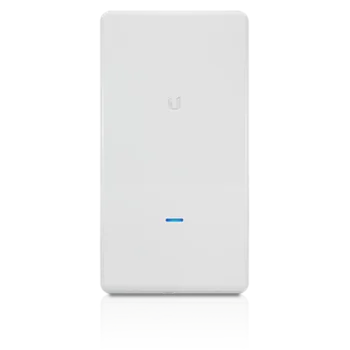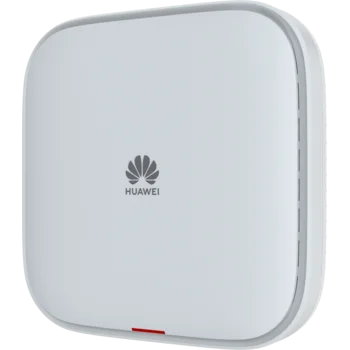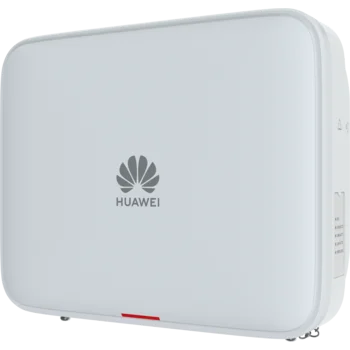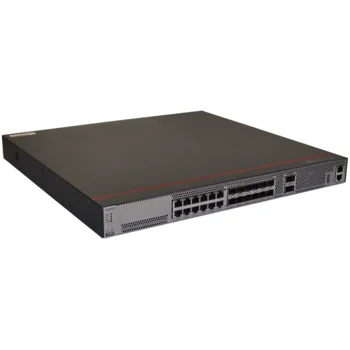Ключевые особенности:
- 1 порт 10G RJ45
- 1 порт 10G SFP+
- 1 порт PoE 1G RJ45
- Пропускная способность до 8,35 Гбит/с (10,75 Гбит/с с RTU лицензией)
- MU-MIMO 2,4 ГГц: 4x4:4 и 5 ГГц: 6x6:6 (2,4 ГГц: 4x4:4, 5 ГГц-0: 8x8:8 или 2,4 ГГц: 4x4:4, 5 ГГц-0: 4x4:4 и 5 ГГц-1: 4x4:4 с RTU лицензией)
- До 1152 пользователя
Описание серии:
Устройства AirEngine 6760-X1 и AirEngine 6760-X1E Huawei — точки доступа для помещений Wi-Fi 6 (802.11ax) по умолчанию поддерживают 10 пространственных потоков, а при использовании лицензии на программное обеспечение Right to Use (RTU) — до 12 пространственных потоков. Обе модели позволяют сформировать программно-конфигурируемую радиосистему (SDR) и способны гибко переключаться между тремя режимами работы: dual-radio, triple-radio, dual-radio + one scanning radio. Устройства идеальны для установки в местах с высокой плотностью пользователей и сильными помехами.
Поддержка оптических каналов 10GE или электрических каналов восходящей связи увеличивает гибкость развертывания, благодаря чему обеспечивается защита и повышается рентабельность вложений. Эти особенности делают устройства оптимальными для установки в небольших и средних офисах компаний, образовательных учреждениях и производственных цехах.
Точка доступа для помещений AirEngine 6760-X1 обладает уникальным преимуществом — встроенными адаптивными антеннами (Smart Antenna), которые компания Huawei разработала во время инновационных исследований технологий 5G. Антенны эффективно усиливают сигнал, который стабильно доходит до перемещающихся пользователей, обеспечивая высокое качество покрытия с полным отсутствием «слепых» зон. AirEngine 6760-X1E можно подключить к нескольким внешним антеннам, адаптируя систему к сложным условиям, например в узких коридорах или в высотных зданиях.
Комплект поставки:
- Точка доступа
- Крепление
Fat/Fit AP mode
| Item | Description |
| WLAN features | Compliance with IEEE 802.11ax and compatibility with IEEE 802.11a/b/g/n/ac/ac Wave 2 Extended Service Set (ESS) in Fit AP mode |
| Network features | Compliance with IEEE 802.3ab Auto-negotiation of the rate and duplex mode and automatic switchover between the Media Dependent Interface (MDI) and Media Dependent Interface Crossover (MDI-X) Compliance with IEEE 802.1q SSID-based VLAN assignment VLAN trunk on uplink Ethernet ports Management channel of the AP uplink port in tagged and untagged mode DHCP client, obtaining IP addresses through DHCP Tunnel data forwarding and direct data forwarding Application identification and QoS classification when AP local forwarding (also called direct forwarding), which can significantly improve voice quality for applications such as Skype, QQ, and STA isolation in the same VLAN IPV4/IPV6 access control lists (ACLs) Link Layer Discovery Protocol (LLDP) Uninterrupted service forwarding upon CAPWAP channel disconnection in Fit AP mode Unified authentication on the AC in Fit AP mode AC dual-link backup in Fit AP mode Network Address Translation (NAT) in Fat AP mode IPv6 in Fit AP mode Soft Generic Routing Encapsulation (GRE) IPv6 Source Address Validation Improvements (SAVI) Multicast Domain Name Service (mDNS) gateway protocol |
| QoS features | WMM parameter management for each radio WMM power saving Priority mapping for upstream packets and flow-based mapping for downstream packets Queue mapping and scheduling User-based bandwidth limiting Adaptive bandwidth management (automatic bandwidth adjustment based on the user quantity and radio environment) to improve user experience Airtime scheduling Air interface HQoS scheduling |
| Security features | Open system authentication WPA2-PPSK authentication and encryption in Fit AP mode |
| Maintenance features | Unified management and maintenance on the AC in Fit AP mode Automatic login and configuration loading, and plug-and-play (PnP) in Fit AP mode Batch upgrade in Fit AP mode Telnet STelnet using SSH v2 SFTP using SSH v2 Remote wireless O&M through the Bluetooth console port Web local AP management through HTTP or HTTPS in Fat AP mode Real-time configuration monitoring and fast fault location using the NMS SNMP v1/v2/v3 in Fat AP mode System status alarm Network Time Protocol (NTP) in Fat AP mode |
| BYOD | NOTE The AP supports bring your own device (BYOD) only in Fit AP mode. Identifies the device type according to the organizationally unique identifier (OUI) in the MAC address. Identifies the device type according to the user agent (UA) information in an HTTP packet. Identifies the device type according to DHCP options. The RADIUS server delivers packet forwarding, security, and QoS policies according to the device type carried in the RADIUS authentication and accounting packets. |
| Location service | NOTE The AP supports the locating service only in Fit AP mode. STA location Working with the location server to locate rogue devices Bluetooth location |
| Spectrum analysis | NOTE The AP supports spectrum analysis only in Fit AP mode. Identification of more than eight interference sources including Bluetooth devices, microwave ovens, cordless phones, ZigBee devices, game controllers, 2.4 GHz/5 GHz wireless video and audio devices, and baby monitors Working with the location server to locate interference sources and perform spectrum analysis on them |
Cloud-based management mode
| Item | Description |
| WLAN features | Compliance with IEEE 802.11ax and compatibility with IEEE 802.11a/b/g/n/ac/ac Wave 2 Basic mode: providing 10 spatial streams, achieving up to 8.35 Gbps for the device RTU mode: providing 12 spatial streams, achieving up to 10.75 Gbps for the device Maximum ratio combining (MRC) Space time block code (STBC) Cyclic Delay Diversity (CDD)/Cyclic Shift Diversity (CSD) Beamforming DL/UL MU-MIMO DL/UL OFDMA Compliance with 1024-QAM and compatibility with 256-QAM/64-QAM/16-QAM/8- QAM/QPSK/BPSK Low-density parity-check (LDPC) Frame aggregation, including A-MPDU (Tx/Rx) and A-MSDU (Tx/Rx) 802.11 dynamic frequency selection (DFS) Priority mapping and scheduling that are compliant with Wi-Fi multimedia (WMM) to implement priority-based data processing and forwarding. Automatic and manual rate adjustment (the rate is adjusted automatically by default) WLAN channel management and channel rate adjustment NOTE For detailed management channels, see the Country Code & Channel Compliance Table. Automatic channel scanning and interference avoidance Service set identifier (SSID) hiding Signal sustain technology (SST) Unscheduled automatic power save delivery (U-APSD) |
| Network features | Compliance with IEEE 802.3ab Auto-negotiation of the rate and duplex mode and automatic switchover between the Media Dependent Interface (MDI) and Media Dependent Interface Crossover (MDI-X) Compliance with IEEE 802.1q SSID-based VLAN assignment DHCP client, obtaining IP addresses through DHCP STA isolation in the same VLAN Access control lists (ACLs) Unified authentication on the Agile Controller Network Address Translation (NAT) |
| QoS features | WMM parameter management for each radio WMM power saving Priority mapping for upstream packets and flow-based mapping for downstream packets Queue mapping and scheduling User-based bandwidth limiting Airtime scheduling Application acceleration for VR and mobile gaming Air interface HQoS scheduling |
| Security features | Open system authentication WPA2-802.1X authentication and encryption (WPA2 enterprise edition) |
| Maintenance features | Unified management and maintenance on the Agile Controller Automatic login and configuration loading, and plug-and-play (PnP) Batch upgrade Telnet STelnet using SSH v2 SFTP using SSH v2 Remote wireless O&M through the Bluetooth console port Web local AP management through HTTP or HTTPS Real-time configuration monitoring and fast fault location using the NMS System status alarm Network Time Protocol (NTP) |
| Общие | |
|---|---|
| Частотный диапазон Wi-Fi, ГГц | 2.4 5 |
| Поддержка MIMO, в диапазоне 2.4ГГц | 4x4 |
| Поддержка MIMO, в диапазоне 5ГГц | 6x6 |
| SFP | Да |
| PoE | 802.3at 802.3bt |
| Портов LAN | 2 |
| Стандарты Wi-Fi IEEE 802.11 | 802.11ax (Wi-Fi 6) 802.11ac (Wi-Fi 5) 802.11n (Wi-Fi 4) 802.11a 802.11g 802.11b |
| Роуминг | 802.11k/v/r |
| Уличный корпус | Нет |
| Порт USB | USB 3.0 |
| Тип антенны | внешняя |
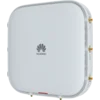
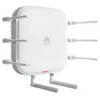
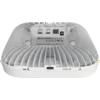
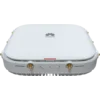
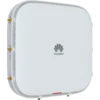
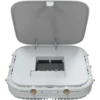
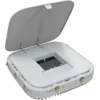
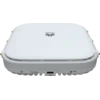











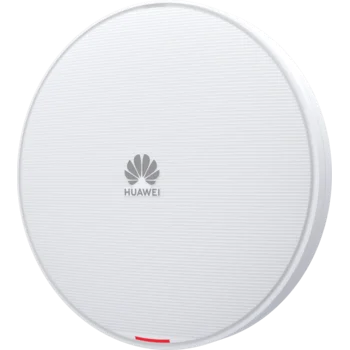
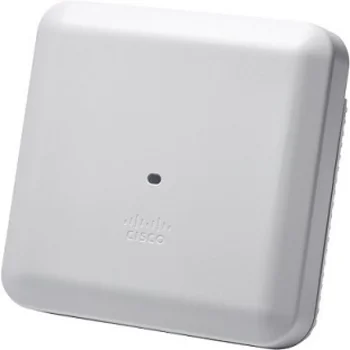
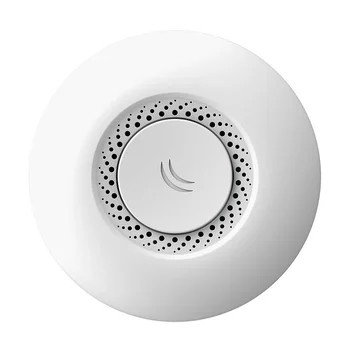
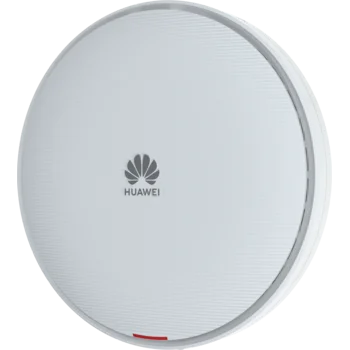

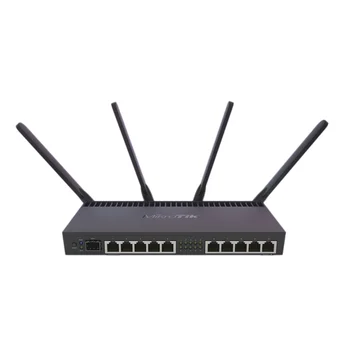
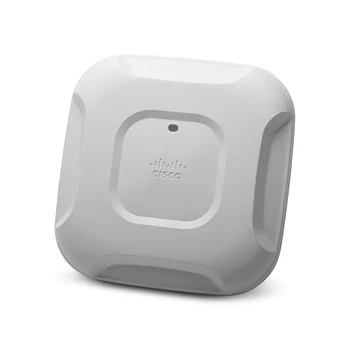
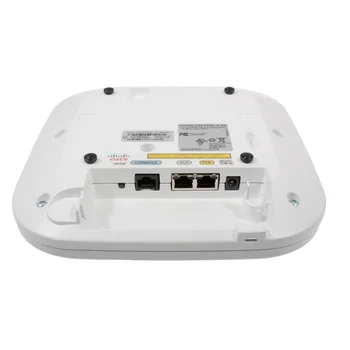

/36932/image-thumb__36932__350x350/31d58a1a2b7609787f0dee98358679c298738e709cc8c3f642a49bbc3dee700f.webp)

